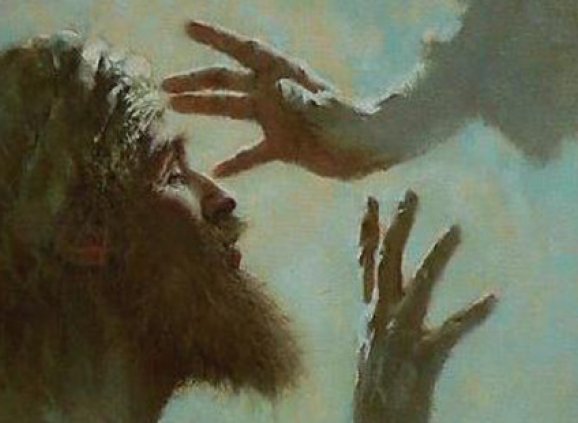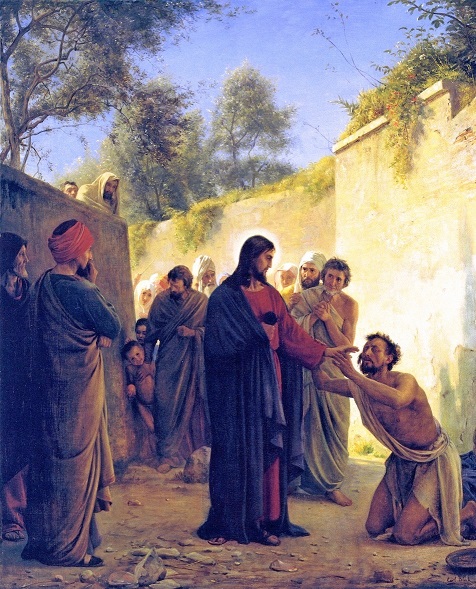Readings: 1 Samuel 16:1-13 | 1 Corinthians 13:1-13 | Luke 18:31-43
Text: Luke 18:31-43
The theme for Quinquagesima is “Grace is not easily understood” and you could broaden that to say that “God’s ways are not easily understood.”

In the lesson from 1 Samuel, we saw that God’s choice for king of Israel is not what Jesse, his sons, or even the prophet Samuel, expected. Was that because God just wanted to keep them on their toes, guessing at what He is going to do next? Not hardly. It’s an indictment against our understanding which we prize so much. It may have been a while since any of you thought of this, but consider the word, “sophomore” for those who are in the second year of school. From the Greek, it literally translates to “wise fool,” with a definite emphasis on the latter—a fool who thinks him or herself wise.
And this is the way that God humbles us in our wisdom, as we heard recently from 1 Corinthians 1: “In the wisdom of God, the world did not know God through wisdom, it pleased God through the foolishness of what we preach to save those who believe…For the foolishness of God is wiser than men, and the weakness of God is stronger than men.” (1 Corinthians 1:21, 25) What is the key which unlocks this wisdom of God?
Consider what happens in the Gospel today in Luke 18. Our Lord clearly predicts His passion (not for the first time):
31 And taking the twelve, he said to them, “See, we are going up to Jerusalem, and everything that is written about the Son of Man by the prophets will be accomplished. 32 For he will be delivered over to the Gentiles and will be mocked and shamefully treated and spit upon. 33 And after flogging him, they will kill him, and on the third day he will rise.” 34 But they understood none of these things. This saying was hidden from them, and they did not grasp what was said.
Even though He says it in plain words, there’s this blindness—a threefold blindness that overcomes the Twelve (v. 34):
- They understood (comprehended) none of these things.
- This saying was hidden from them.
- They did not know/understand what was said.

That is, they were totally in the dark when it came to understanding exactly how Jesus would save them and be the Savior of the whole world. It was as if they couldn’t even comprehend the sounds coming out of their Lord’s mouth as He was saying this. How ironic that those who were with the Lord day in, and day out, and yet utterly powerless to understand this crucial teaching! This is why we say today that “Grace is not easily understood” and why our Lutheran confessions explain, “[God] gives the Holy Spirit who produces faith, where and when he wills, in those who hear the gospel.” (Augsburg Confession, V)
To illustrate how this isn’t a matter of what “makes sense,” they went on to Jericho. Even though the disciples were helpless to unravel these things, the Holy Spirit granted understanding to an unexpected person:
35 As he drew near to Jericho, a blind man was sitting by the roadside begging. 36 And hearing a crowd going by, he inquired what this meant. 37 They told him, “Jesus of Nazareth is passing by.” 38 And he cried out, “Jesus, Son of David, have mercy on me!”
Reason would dictate that those who had the most exposure to Jesus, heard the most of His teachings, would be the best informed when it comes to recognizing who He is and what He has come to do. But this chapter 18 in Luke’s Gospel is about faith receives, not what reason can accomplish. Just the very city in which this takes place carries a reputation. Jericho was the first Canaanite city the Israelites encountered (Joshua 2). Even before God’s way of conquest—marching around the city walls—was demonstrated, there was seen an unexpected believer in Rahab. James commends her as a woman of faith: “In the same way [as Abraham] was not also Rahab the prostitute justified by works when she received the messengers and sent them out by another way? 26 For as the body apart from the spirit is dead, so also faith apart from works is dead.” (James 2:25-26) The place on the way to Jerusalem, which was expected to be a place of ignorance, actually was the place where Rahab, the faithful woman, had lived.

So near Jericho, they meet another believer: a blind man who has been listening in faith about Jesus: He is the Son of David—the one seen by God not as man sees—that is to see with the eyes of faith. Just like with Jesse and his sons, God is not choosing as man would, but as God does, who works in the inner man or heart.
39 And those who were in front rebuked him, telling him to be silent. But he cried out all the more, “Son of David, have mercy on me!” 40 And Jesus stopped and commanded him to be brought to him. And when he came near, he asked him, 41 “What do you want me to do for you?” He said, “Lord, let me recover my sight.” 42 And Jesus said to him, “Recover your sight; your faith has made you well.” 43 And immediately he recovered his sight and followed him, glorifying God.
Those who were leading the procession of the Lord through Jerusalem ought to be the ones who had the best understanding, but instead they were trying to silence this stupid beggar. “Kyrie eleison!” He’s crying after Jesus. Doesn’t he know this will get us in trouble with Rome, who insists that we give this cry to Caesar?
But the “problem” isn’t this blind man who is crying after Jesus; it’s us, who aren’t. This physically blind man has been given eyes to recognize Jesus with the sight which truly matters: “Jesus, Son of David, have mercy on me!” Kyrie, eleison! He’s crying out the most simple, and yet profound prayer in the Church: “Lord, have mercy.” To our thought, it doesn’t sound like much. How could you ask the Lord for so little as to have mercy? But in asking the Lord to have mercy is to ask Him to remember more than His just judgment against us. Instead, look upon us through the blood of Jesus Christ. Look upon us in your promise to save, and be as merciful to us as possible!
Look at us and our children, and do not give us what we deserve, but what your mercy toward sinners appoints. Like blind men who can only receive what your grace pours out, give us eyes to see Jesus and your mercy upon the cross! Give us eyes to see why He goes to the cross.

Up to this point, many people have been asking Jesus to arbitrate (Luke 12:13-14), and to settle theological arguments (Luke 11:53-54). But notice the ones who the Lord answers: Those who call on Him simply saying, “Lord, have mercy upon us!” Kyrie Eleison. Through granting us repentance, God gives us an understanding which our reason can’t see: “For He will be delivered over…mocked and shamefully treated and spit upon. And after flogging him, they will kill him.” Yet, how often do we think of this merely as a cold transaction between the Father and the Son for us without any connection to us?
What repentance reveals is that it is actually our own sins for which Christ suffers. We would choose for someone else to suffer instead of us bearing the punishment we deserve. Our pride mocks the Son of God who has come in order to liberate us from sin, death, and the devil. By continuing in our sins, so that grace may abound, we are no better than those who mock Him to His face saying, “He saved others; He cannot save Himself.” (Luke 23:35) And yet those wounds and mockery were for you. The flogging He endured is testimony to the ways we deserve to bear punishment for our disobedience to God and flagrant disregard for His stern commandments!
This grace is most difficult for us to understand, and without the Holy Spirit, all of us would be hopeless to find it! Yet, despite what we deserve, “the Holy Spirit has called me by the Gospel, enlightened me with His gifts, sanctified and kept me in the true faith.” (Small Catechism, Creed, 3rd Article)

And rather than the judgment that we well know we deserve, He comes to the repentant heart with the question, “What do you want me to do for you?” [The blind man] said, “Lord, let me recover my sight.” 42 And Jesus said to him, “Recover your sight; your faith has made you well.” And here we see how the Lord answered this poor man with more than He ever imagined or deserved. He asked simply for his sight to be restored. Yet in the Lord’s answer, He answered His request and gave him all that he truly needed: “Your faith has saved you.”
This is how the Lord deals with each of us, whom He draws in humble repentance, with eyes that He Himself has opened. Kyrie, eleison, Lord, have mercy. We don’t know what we ought to ask for, but the Holy Spirit has taught us that HERE in Jesus is where to look for help. Though we sit on the darkened side of that “mirror dimly” which St. Paul describes in those rich words in 1 Corinthians 13:12, our Lord and God has given us the sight which is better. By His grace, we are given to see Jesus Christ with all His gifts: Our sins, small and great, are atoned for by His blood passion. Through Him, God the Father has made peace with us. Now, we approach Him as dear children asking their dear Father. However weak or strong we look in the eyes of man, He has given us a heart which He knows and named us as His own.
In the Name of the Father and of the + Son and of the Holy Spirit. Amen.









